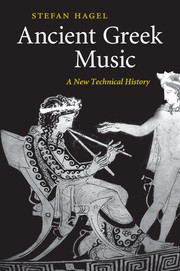Book contents
- Frontmatter
- Contents
- List of diagrams
- List of tables
- List of figures
- List of abbreviations
- Preface
- 1 The evolution of ancient Greek musical notation
- 2 Notation, instruments and the voice
- 3 Notation in the handbooks
- 4 Strings and notes
- 5 Fine tuning
- 6 Going beyond Ptolemy?
- 7 Assisted resonance
- 8 The extant musical documents
- 9 Aulos types and pitches
- 10 Before Aristoxenus
- 11 Synthesis
- Bibliography
- Indices
5 - Fine tuning
Published online by Cambridge University Press: 03 May 2010
- Frontmatter
- Contents
- List of diagrams
- List of tables
- List of figures
- List of abbreviations
- Preface
- 1 The evolution of ancient Greek musical notation
- 2 Notation, instruments and the voice
- 3 Notation in the handbooks
- 4 Strings and notes
- 5 Fine tuning
- 6 Going beyond Ptolemy?
- 7 Assisted resonance
- 8 The extant musical documents
- 9 Aulos types and pitches
- 10 Before Aristoxenus
- 11 Synthesis
- Bibliography
- Indices
Summary
GENERAL CONSIDERATIONS
While dealing with the more general outlines of ancient scales, we were able to talk in terms such as tone, semitone and, in some cases, quartertone, indulging in a simplification similarly familiar to us as to ancient musicians and music theorists. Even though if the actual intervals of performance may diverge considerably from any fixed definition, the simplified terms make sense in a music culture that is based, either historically or synchronically, on diatonic heptatony. In this musical paradigm, which is strongly associated with stringed instruments, and whose origins lie beyond the second millennium BC, the main unit is defined as the difference between a pure fifth and a pure fourth: the tone. When it was constructed recurrently, until there remained no gap large enough to fit another tone into, the result is ‘our’ typical heptatonic scale, called ‘diatonic’ by the Greeks: ‘constructed by tones throughout’.
If one carries the tuning process further, another fifth or fourth will cut an existing tone in halves, apparently: semitones. Similar intervals were already established as the remaining gaps in the seven–note scale.
The quartertone, on the other hand, does not come up in resonant tuning of strings. Ancient tradition attributed its invention to aulos players, with good reason: the technique of half–covering finger holes easily leads to such small intervals. Their classification as quarter–tones, however, presupposes a theoretical consciousness that crosses the borders between instruments and musical styles.
- Type
- Chapter
- Information
- Ancient Greek MusicA New Technical History, pp. 135 - 216Publisher: Cambridge University PressPrint publication year: 2009



